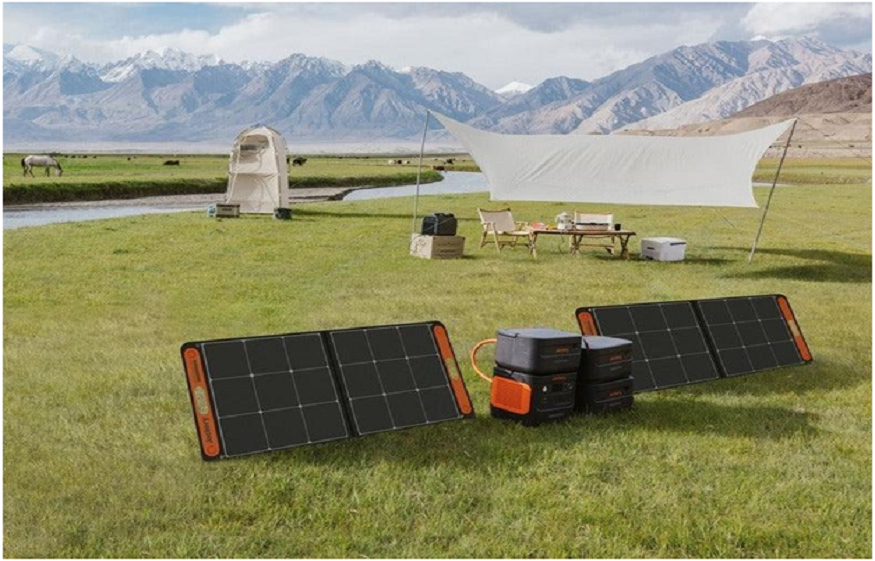Outdoor heaters are effective in cold weather conditions, especially when selected and used correctly. Whether you’re camping under the stars in the outback or chilling by the pool on brisk winter nights, an outdoor heater makes all the difference. Aussies love the off-grid lifestyle, and with cool gadgets like a solar-powered power bank, staying warm without traditional power is totally doable.
Solar generator systems are becoming increasingly popular for powering heating needs, no matter where you are. Let’s explore how outdoor heaters perform in low temperatures and how to stay warm when living off the grid.
(Copyright photo fromhttps://www.freepik.com/free-photo/smiley-couple-warming-up-hands-near-heater_24234557.htm)
How Outdoor Heaters Work in Cold Weather
To grasp the effectiveness of an outdoor heater in low temperatures, it is helpful to explore the basic science behind how these devices function. Most heaters, regardless of type, operate by producing radiant or convection heat. Radiant heaters warm objects and people directly, while convection heaters warm the air around them.
In cold weather, radiant heat is often more effective outdoors because it does not rely on warming large volumes of air that might be quickly lost to wind or cold. Several factors impact performance:
Temperature Range
Many heaters are rated for specific temperature ranges. In sub-zero conditions, especially in inland areas like parts of Tasmania or the Snowy Mountains, certain models may struggle unless they are designed for extreme weather.
Wind Exposure
Australia’s coastal and mountain regions often experience high wind speeds, which can quickly dissipate warm air. That’s why windproof or directional outdoor heaters or heaters placed in enclosed gazebos are more effective.
Humidity Levels
Humidity can affect how heat is retained or lost. Higher humidity can make cold feel more intense, especially in the rainforest or near the coast. Drier air, as seen in inland regions like Broken Hill, cools down faster, meaning your outdoor heater must work harder. Radiant outdoor heaters counteract this by focusing heat on people rather than the environment.
In more humid areas, like Queensland’s hinterland, heat retention tends to be slightly better, making even small-capacity heaters more effective.
Types of Outdoor Heaters for Off-grid Use
Australia’s outdoor culture thrives in diverse terrains, which means different heating needs. Not all outdoor heaters are created equal, especially when you are miles away from the nearest power outlet. Here are four primary heater types suitable for off-grid situations:
Propane/gas Heaters
These are popular in Australia for their portability and strong heating power, commonly used for outdoor activities such as camping and tailgating. However, they require fuel refills and must be used safely in ventilated areas to avoid any risk of carbon monoxide buildup[1].
Electric Heaters
These heaters are ideal when you have a power source, such as a portable heater plugged into a generator or a solar-powered battery. They are clean and silent and come with built-in safety features.
Solar-powered Heaters
These are becoming more common in eco-conscious Aussie households, offering an energy-efficient way to stay warm. While they don’t provide the same raw heat output as traditional models, pairing them with solar generators allows for reliable off-grid heating, making them a sustainable option for those looking to reduce their environmental impact.
Wood-burning Heaters
Loved for their ambience and reliability, these heaters are great in rural areas where wood is readily available. They do, however, require ventilation and maintenance.
Each wood-fired heater in Australia is estimated to contribute to annual health-related costs of approximately A$3,800[2], primarily due to air pollution and its impact on respiratory health.
Here is a quick comparison of all four types:
| Type | Pros | Cons |
| Propane/gas |
|
|
| Electric |
|
|
| Solar-powered |
|
|
| Wood burning |
|
|
Each of these has a place in the off-grid toolkit. For example, a portable heater powered by propane may be ideal for quick setup, but when paired with solar generators, electric or solar models offer more eco-conscious alternatives.
Creative Off-grid Heating Hacks for Different Scenarios
Australians live for the outdoors, be it weekend bush retreats, boat journeys on the Murray River, or stargazing by the campfire. Staying warm off-grid in Australia is not just about choosing the right outdoor heater; it is also about being smart with your setup. Here is how different environments can benefit from tailored heating solutions:
Camping Trips
Australia is made for camping. When camping in areas like Kosciuszko National Park or the Flinders Ranges, temperatures can drop significantly, especially at night. Here, electric portable heater units paired with solar generators provide the perfect combo of portability and power.
Solar power contributes to 16% of Australia’s total electricity generation[3], making it ideal for powering devices like outdoor heaters off-grid. With ample capacity and multiple AC outlets, solar generators allow campers to run electric heaters, lights, and cooking equipment without breaking a sweat.
Boating Adventures
Staying warm on the water is crucial, especially during early morning sails in Tasmania or South Australia. While traditional marine heaters are effective, many boaters are turning to portable outdoor heaters powered by a high-capacity boat battery and solar generator setup.
To ensure warmth on a rocking boat, choose a portable heater with tip-over protection. For localized warmth, heated seat pads or blankets powered via USB are a great option.
Additionally, positioning solar panels on the deck to charge the boat’s battery while soaking up sunlight during the day can keep everything powered up.
Finally, sealing your cabin or cockpit with wind-blocking canvas helps trap heat, creating a more comfortable environment on chilly waters.
Backyard and Pool Areas
Evening near the pool in Melbourne or Adelaide can get chilly fast. Enjoying a barbecue by the pool does not need to stop in winter. A wall-mounted electric outdoor heater or fire pit works well. Combine this with a solar water heater for the pool to extend the swimming season. If you do not have mains power nearby, solar-powered generators are a clean backup power source.
In warmer states like Queensland or New South Wales, poolside evenings may still get a little cold. A solar outdoor heater combined with a solar water heater setup can help maintain a comfortable temperature, allowing you to enjoy the outdoors even after the sun sets.
Remote Cabins
Nothing beats an off-grid cabin retreat in the Snowies or Southern Highlands. Wood-burning heaters and indoor fireplaces offer a rustic charm, but having a backup is a wise idea. An electric outdoor heater powered by the Jackery Solar Generator 1000 Plus ensures comfort even during unexpected weather.
For lighting and electric heating pads, a solar generator offers a quiet, clean solution that is perfect for remote cabins. It powers your devices and ensures you have reliable energy for staying warm and comfortable. With integrated battery management, you’ll have all the power you need, even in the most off-grid locations.
(Copyright photo from https://www.freepik.com/free-photo/people-traveling-winter_181368754.htm)
Key Considerations When Choosing an Outdoor Heater
Selecting the right outdoor heater for off-grid living in Australia involves more than just grabbing the highest BTU model you can find. With variable climates ranging from the chilly Victorian Alps to breezy coastal evenings in Byron Bay, your heating solution should suit your specific off-grid lifestyle, climate conditions, and power setup.
Here is a detailed look at what matters most:
Portability
A portable heater is important for anyone who enjoys moving between locations, whether you are road-tripping in a van or camping in the Golden Outback. Look for heaters that are compact, lightweight, and easy to carry. Foldable legs, carry handles, and wheeled bases make transport easier and more manageable. This is especially important when access to your campsite or cabin involves a bit of a hike.
Power Source Availability
Your choice of power source can make or break your off-grid heating experience. Electric heaters are clean and efficient but require constant electricity. Gas heaters heat up quickly, but they require regular refills of propane. In remote Australian regions, it might be challenging to find a refill station. Something to think about if you’re living or travelling far from urban hubs.
Heating Capacity
Measured in BTUs for gas or watts for electric, your heater must match the space you are trying to warm. A small tent needs far less heat than a semi-permanent cabin in Tasmania’s highlands. Always check the output specs and calculate based on room size, insulation, and outdoor conditions.
For larger spaces, combining multiple heaters or opting for high-output models is a smart approach.
Safety Features
Safety becomes even more important off-grid. Look for features like tip-over shut-off, oxygen depletion sensors, and flame-retardant casings. These can prevent accidents, especially when you are not near emergency services. Auto shut-off and overheat protection are absolute musts.
Budget
Gas heaters may be budget-friendly upfront, but electric models powered by solar offer long-term savings and lower environmental impact. For example, combining an electric heater with a solar-powered power bank or solar setup like the Jackery generators can reduce reliance on fossil fuels.
For hot water needs in cabins or remote homes, an off-grid water heater can complement your heating system perfectly, offering warm water for cooking and bathing even miles from the grid.
Jackery Solar Generator for Off-Grid Heating
When the question is how to keep an outdoor heater running efficiently in off-grid conditions, Jackery offers one of the most reliable answers. Jackery is a trusted name in off-grid solar solutions, and their products have earned the trust of thousands of Australians who live, travel, or holiday without access to city power.
Australia’s diverse landscape requires reliable solutions for off-grid living, and their solar generators are built to provide efficient power for off-grid heating in even remote locations.
Jackery Solar Generator 1000 Plus
For Australians exploring off-grid living, the Jackery Solar Generator 1000 Plus offers a powerhouse solution that blends portability, power, and clean energy. With a compact design that hides an impressive 1264Wh capacity and a 2000W output, this unit supports up to 99% of home and outdoor appliances.
Thanks to its pass-through charging capability, users can simultaneously charge the station and run a portable heater, ensuring uninterrupted warmth even in rugged conditions.
For extended stays in remote cabins or backyards, this generator is expandable. It supports up to three additional battery packs, pushing the total capacity to 5 kWh. This is enough to run heating setups and even an off-grid water heater for one to three days.
Solar charging is seamless and fast. When paired with four 100W panels, its advanced IBC technology achieves a full charge in just 4.5 hours under Australia’s strong sun.
Therefore, Jackery Solar Generator 1000 Plus can offer reliable power for Aussie off-grid living, satisfying your off-grid heating needs on cold days.
Jackery Solar Generator 600 Plus
Weighing just 7.3 kg and featuring a foldable handle, Jackery Solar Generator 600 Plus is built for portability. It is ideal for campers, remote cabin dwellers, and even boaters operating off a boat battery setup.
With an 800W output and 632Wh capacity, it is perfectly suited to run small to mid-sized outdoor heaters, pool heating setups, or other essentials like cooking appliances and lighting.
Besides, charging is fast and versatile. The emergency supercharging mode activated via the Jackery app takes the battery from 0 to 100% in just one hour. It is ideal for unpredictable Aussie weather or when sunlight is limited. Beyond the supercharging mode, its fast charging mode fully charges in 1.6 hours while preserving long-term battery health.
Built tough for the Australian outdoors, Jackery Solar Generator 600 Plus ensures reliable performance in remote locations like off-grid cabins, camping trips, or during outdoor adventures, where resilience is essential.
Conclusion
So, do outdoor heaters work in cold weather? Absolutely. With the right type of heater and a reliable power source, you can stay warm even when you are off-grid in the chillier corners of Australia. Whether you are warming your campsite, boat deck, or backyard retreat, Jackery products offer Australians the flexibility to stay warm without compromising on sustainability or mobility.
Stay warm anywhere and anytime. Explore Jackery’s reliable solar generators for safe, off-grid outdoor heater power and complete energy freedom.



